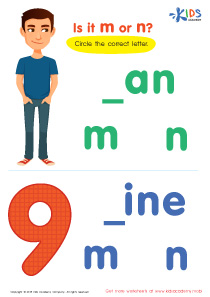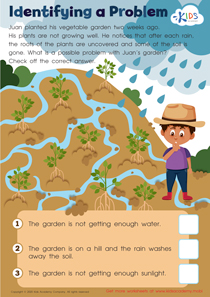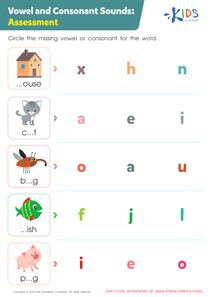Science Lessons | Plants, Kindergarten
0 results
Our Plants Lessons for Kindergarten children are perfect for introducing young learners to the world of nature. These interactive worksheets and educational videos will teach your child about the different parts of plants and how they grow. From seed to stem, leaf, flower and fruit, your child will learn about photosynthesis, the water cycle and the importance of pollinators. Our assessment quizzes will help you monitor your child's progress, ensuring they understand all there is to know about plants in a fun and educational way. Give your child a gift they'll cherish with our Plants Lessons and watch their love of nature grow!
As young children continue to discover and explore the world around them, it is vital to expose them to educational materials that will not only capture their interest but also improve their learning comprehension. One area in which this can be achieved is through the study of Plants. Plants play a critical role in our lives by providing food, cleaning the air we breathe, and beautifying our environment, making it essential for kids to learn about them from an early age.
At Kindergarten level, children can benefit greatly from interactive lessons on Plants. These Plants Lessons help to stimulate the minds of young learners and increase their understanding of the various aspects of plant life. Interactive worksheets, educational videos, and assessment quizzes enable children to engage with the content in varied ways. These approaches provide better engagement and improve the retention rate of the learners, allowing them to learn more effectively.
Interactive worksheets provide an opportunity for children to observe and label different parts of plants such as leaves, stems, and flowers, helping them learn about plant structure. Additionally, these activities encourage the development of essential cognitive skills such as problem-solving, critical thinking, and hand-eye coordination. When children engage with these worksheets, the visual representations help them retain information better and develop a practical understanding of the subject.
Educational videos are also an important tool in a child's learning process. These videos provide colorful and stimulating content that grabs the attention of children, making learning fun and interactive. Through these videos, children can watch the life cycle of a plant from the time it sprouts to the moment it produces seeds. They can also learn about the different processes required for germination, such as photosynthesis and pollination. Additionally, children can learn about different plant species, including their appearance, characteristics, and the environments they thrive in. By using visual aids, children can visualize and internalize the lessons conveyed in the video effectively.
Assessment quizzes provide an efficient way of evaluating the child's learning progress. This form of learning allows kids to test their knowledge and understanding of the topic, reinforcing learning and improving memory retention. The quizzes also help children build essential skills like reasoning and comprehension as they strive towards achieving higher scores.
In conclusion, the use of interactive worksheets, educational videos, and assessment quizzes in Plant Lessons are essential in the early education of children. These lessons accelerate their cognitive development and improve their understanding of the natural world, specifically towards plants, a vital part of our ecosystem.















